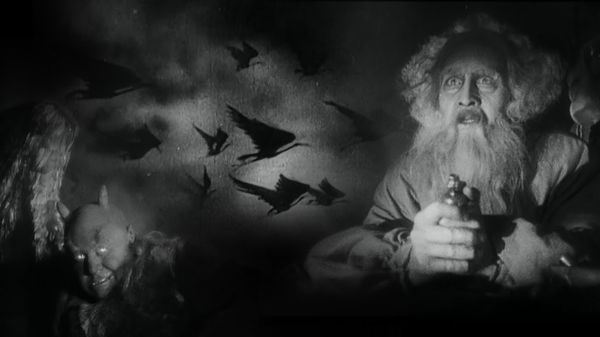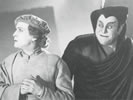Eye For Film >> Movies >> Faust (1926) Film Review
Faust
Reviewed by: Jennie Kermode

In one of the great classics of German expressionist cinema, Goethe's famous tale of the man who makes a pact with a demon is brought to life by FW Murnau, perhaps the silent era's most brilliant director. This is the kind of work which will never go out of date. It still has plenty of thrills and chills - and sinister laughs - for a modern audience. It also looks stunning, and the special effects, many of them employed for the first time ever, are spectacular.
As the hero, both in youth and old age, Goesta Ekmann is admittedly somewhat blank, but this would seem to be intentional - he is, after all, the straight man, a stooge for the antics of the playful and malicious Mephisto. The latter is sent from Hell following an argument between the Devil and the Archangel Michael, whereby the future ownership of the Earth is wagered upon the demon's ability to destroy what is divine in the hero.

Emil Jannings is tremendously charismatic in the demonic role, alternately capering like a pantomime villain and setting up vicious traps for his supposed master. One after another, everyone Mephisto encounters is tempted to corruption or death; the only one who seems able to challenge him is the maiden Gretchen, whose very innocence inspires in Faust an obsession which may lead to her doom.
The story develops slowly, but Murnau needs all of its 116 minutes (astonishingly long for the time) to display his fantastic visual imagery. A full moon over a crossroads at midnight; a burning Bible turning to Satanic text; exquisite model villages unfolding into Escher-like landscapes; a huge parade of dancers and artificial elephants - remarkable imagery which enables the reader to share in Faust's seduction. Murnau was strongly influenced by some of his contemporaries - we see here the deliberately obscure geometry favoured by Robert Wiene, for instance - but in Faust he has created something entirely his own.
Some of the lifestyles and attitudes displayed in this film may seem inaccessibly antiquated to modern viewers, but they were daring in their time, and critical to Murnau's message about the ever-present possibility of redemption. There are moments of startling eroticism, an intense focus on pleasure to contrast with the hero's periods of self-doubt, in which latter he is shown sitting alone atop a craggy mountain. This is essentially a modern film, indicative of changing times, which makes its story all the more potent and provides it with a lasting emotional charge.
The histrionic acting style which made effective communication possible in the silents is expertly managed, though, since so much of the tale depends on verbal negotiation, there are frequent intertitles - those reading them in the original German may encounter some difficulty on account of the archaic script used, but this writing is every bit as beautiful as the picture itself. Murnau's precise use of light moves between cruelly stark black and white and moody gloom, making a strong contribution of its own to the characters and the wonderfully detailed sets. This is an example of the silent movie at its very best.
Reviewed on: 04 Apr 2009















